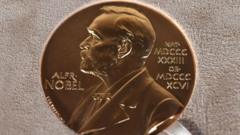The medicine Nobel Prize goes to 3 scientists for work on peripheral immune tolerance
PositiveHealth

Three scientists, Mary E. Brunkow, Fred Ramsdell, and Shimon Sakaguchi, have been awarded the Nobel Prize in Medicine for their groundbreaking research on peripheral immune tolerance. Their work is crucial as it sheds light on how the immune system can differentiate between the body's own tissues and foreign invaders, which is vital for developing treatments for autoimmune diseases. This recognition not only honors their contributions but also highlights the importance of understanding immune responses in advancing medical science.
— Curated by the World Pulse Now AI Editorial System




